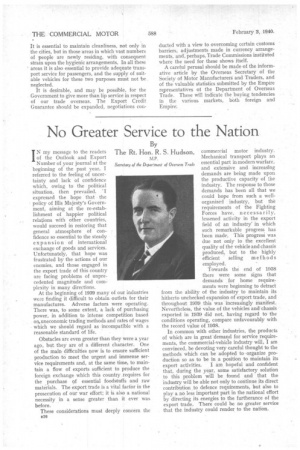No Greater Service to the Nation
Page 46

If you've noticed an error in this article please click here to report it so we can fix it.
By The Rt. Hon. R. S. Hudson,
IN my message to the readers of the Outlook and Export Number of your journal at the beginning of the past years I referred to the feeling of uncertainty and lack of confidence which, owing to the political situation, then prevailed. "I expressed the hope that the policy of His Majesty's Government, aiming at the re-establishment of happier political relations with other countries, would succeed in restoring that general atmosphere of confidence so essential to the steady expansion of international exchange of goods and services. Unfortunately, that hope was frustrated by the actions of our enemies, and those engaged in the export trade of this country are facing problems of unprecedented magnitude and complexity in many directions.
At the beginning of 1939 many of our industries were finding it difficult to obtain outlets for their manufactures. Adverse factors were operating. There was, to some extent, a lack of purchasing power, in addition to intense competition based on. uneconomic trading methods and rates of wages which we should regard as incompatible with a reasonable standard of life.
Obstacles are even greater than they were a year ago, but they are of a different character. One of the main difficulties now is to ensure sufficient production to meet the urgent and immense service requirements and, at the same time, to maintain a flow of exports sufficient to produce the foreign exchange which this country requires for the purchase of essential foodstuffs and raw materials. The export trade is a vital factor in the prosecution of our war effort; it is also a national necessity in a sense greater than it ever was before.
These considerations must deeply concern the commercial motor industry. Mechanical transport plays an essential part in modern warfare, and extensive and increasing demands are being made upon the productive capacity of the industry. The response to those demands has been all that we could hope from such a wellorganized industry, but the requirements of the Fighting Forces have, necessarily, lessened activity in the export field of an industry' in which such remarkable progress has been made. This progresi was due not only to the excellent quality of the vehicle and chassis produced, but to the highly efficient selling mef hods employed.
Towards the end of 1938 there were some Signs that demands for home requirements were beginning to detract from the ability of the industry to maintain its hitherto unchecked expansion of export trade, and throughout 1939 this was increasingly manifest. Nevertheless, the value of the vehicles and chassis exported in 1939 did not, having regard to the conditions operating, compare unfavourably with the record value of 1938.
In common with other industries, the products of which are in great 'demand for service requirements, the commercial-vehicle industry will, I am convinced, be devoting very careful thought to the methods which can be adopted to organize production so as to be in a position to maintain its export activities. I am hopeful and confident that, during the year, some satisfactory solution to this problem will be found and that the industry will be able not only to continue its direct contribution to defence requirements, but also to play a no less important part in the national effort by directing its energies to the furtherance of the export trade. There could be no greater service that the industry could render to the nation.








































































































